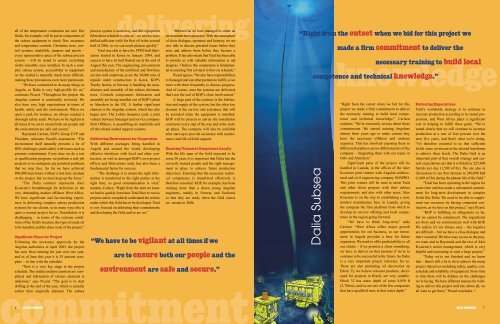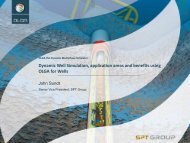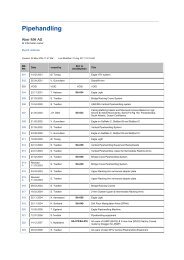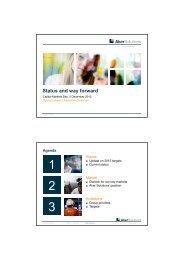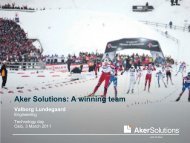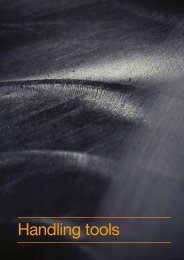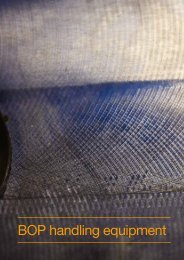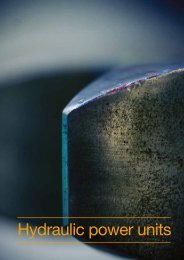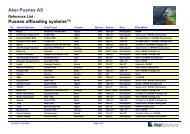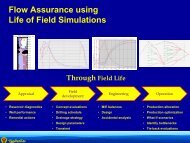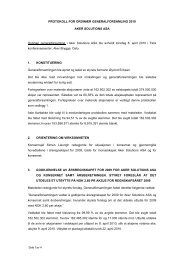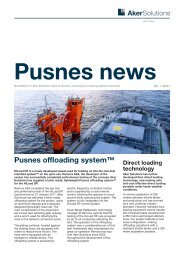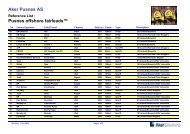Profile: Total's Daniel Picard Kristin: The First HPHT ... - Aker Solutions
Profile: Total's Daniel Picard Kristin: The First HPHT ... - Aker Solutions
Profile: Total's Daniel Picard Kristin: The First HPHT ... - Aker Solutions
Create successful ePaper yourself
Turn your PDF publications into a flip-book with our unique Google optimized e-Paper software.
all of the temperature constraints are met. Hotfluids, for example, will be put in components ofthe subsea equipment to check flow assuranceand temperature controls. Christmas trees, controlsystems, manifolds, jumpers and spools –every representative piece of the subsea processsystem – will be tested to ensure everythingworks smoothly once installed. In such a complexsubsea system, accessibility to equipmenton the seabed is naturally much more difficult,making these precautions even more paramount.“We have committed to do many things inAngola, so Dalia is very high-profile for us,”continues <strong>Picard</strong>. “Throughout the project theAngolan content is continually reviewed. Wealso have very high expectations in terms ofhealth, safety and the environment. When weopen a yard, for instance, we always conduct athorough safety audit. We have to be vigilant atall times if we are to ensure both our people andthe environment are safe and secure.”Raymond Carlsen, KOP’s Group EVP andPresident, reiterates <strong>Picard</strong>’s assessment. “<strong>The</strong>environment itself naturally presents a lot ofHSE challenges, particularly with issues such aspressure containment. Every time we do a testor qualification program, we perform a safe jobanalysis so we anticipate any potential problemsthat we may face. So far we have achieved800,000 man-hours without a lost time incidenton the project, but we must keep up the focus.”“<strong>The</strong> Dalia contract represents <strong>Aker</strong>Kvaerner’s breakthrough for deliveries in thevery demanding market offshore West Africa.We have significant and far-reaching experiencein delivering complex subsea productionsystems for our clients, so in many ways this isquite a normal project for us. Nonetheless it ischallenging – in terms of the extreme conditionsof the field’s location, the type of crude oilto be handled, and the sheer scale of the project.”deliveringprocess system is underway, and this equipmentfabrication schedule is critical – we need to havedrilled sufficient wells for first oil in the secondhalf of 2006, so we can reach plateau quickly.”Total was able to have the FPSO hull fabricationstarted in Korea in January 2004, andexpects to have its hull floated out at the end ofAugust this year. <strong>The</strong> engineering, procurementand manufacture of the umbilical and flowlinesare also well underway, as are the 30,000 tons oftopside under construction in Korea. KOP’sTranby factory in Norway is handling the manufactureand assembly of the subsea christmastrees. Controls components fabrication andassembly are being handled out of KOP’s plantin Aberdeen in the UK. A further significantelement is the Angolan content, which has alsobegun now. <strong>The</strong> Lobito Sonamet yard, a jointventure between Sonangol and service companyStolt Offshore, is assembling six manifolds andall the related seabed support systems.Cultivating Environment for CooperationWith different packages being handled inAngola and around the world, developingeffective interfaces with local and other contractors,as well as amongst KOP’s own projectoffices and fabrications units, has also been afundamental factor for success.“<strong>The</strong> challenge is to ensure the right informationis transferred to the right parties at theright time, so good communication is vital,”remarks Carlsen. “Right from the start we knewwe had to quickly learn how Total likes to run itsprojects and to completely understand the criteriaunder which this field has to be developed. Totalis very focused on delivering their commitmentsand developing the field, and so are we.”“Between us we have managed to create anenvironment that is proactive. With this atmosphereof close dialogue, openness and honesty, we arenow able to discuss potential issues before theyarise and address them before they become aproblem. It has also meant that Total has been ableto provide us with valuable information to aidprogress. I believe this cooperation is fundamentalto ensuring first oil starts to flow on schedule.”<strong>Picard</strong> agrees, “We also have responsibilitiesto Sonangol and our other partners to fulfill, so wemeet with them frequently to discuss progress.And of course, once the systems are delivered,that’s not the end of KOP’s close involvement.”A large part of the contract is the fabricationand supply of the system, but the other keyelement is the service and assistance that willbe provided when the equipment is installed.KOP will be present to advise the installationcontractor every step of the way and at the startupphase. <strong>The</strong> company will also be availableafter start-up to provide assistance with maintenanceand life-of-field support.Ensuring Technical Competence LocallyWith the life span of the field expected to besome 20 years, it is important that Dalia has thecorrectly trained people and the right managementin place to achieve future productionobjectives. Ensuring that the necessary technicalcompetence is transferred effectively istherefore essential. KOP, for example, has beentraining more than a dozen young Angolanengineers, mainly in Norway and Scotland,so that they are ready when the field comeson- stream in 2006.Significant Phase for ProjectFollowing the necessary approvals by the “We have to be vigilant at all times if weAngolan authorities in April 2003, the projecthas now been running for just over one year,and as of June this year it is 35 percent complete– in line with the schedule.are to ensure both our people and the“Now is a very key stage in the projectschedule. <strong>The</strong> studies and procurement are completed,and fabrication of various elements isenvironment are safe and secure.”underway,” says <strong>Picard</strong>. “<strong>The</strong> goal is to startdrilling at the end of the year, which is actuallycommitmentearlier than originally planned. <strong>The</strong> subsea6“Right from the outset when we bid for this project weDalia Subseamade a firm commitment to deliver theknowledgenecessary training to build localcompetence and technical knowledge.”“Right from the outset when we bid for thisproject we made a firm commitment to deliverthe necessary training to build local competenceand technical knowledge,” Carlsenexplains. “We’re extremely serious about thesecommitments. We started training Angolansalmost three years ago to make certain theyhave the necessary offshore and onshoreexpertise. This has involved exposing them todifferent disciplines across different parts of thecompany – integrating them with our teams inOslo and Aberdeen.”Significant parts of the project will behandled in Luanda, in the offices of the <strong>Aker</strong>Kvaerner joint venture with Angolan architecturaland civil engineering company SOAPRO.This joint venture will be used to assist Totaland other client projects with their subsearequirements, and also with other areas. <strong>Aker</strong>Kvaerner is on the way to establishing a new,modern maintenance base in Luanda, givingthe company the firm platform from which todevelop its service offering and local competencein the region going forward.“We have to think long-term,” addsCarlsen. “West Africa offers major growthopportunities for our business, so our investmentin Angola provides a base for futureexpansion. We need to offer predictability to allour clients – if we promise a client something,we have to deliver on that promise if we’re tocontinue to be successful in the future. So Daliais a very important project reference for us.<strong>The</strong>re are also promising oil discoveries onBlock 32; we believe relevant products, developedfor projects in Brazil, are very suitable.Block 32 has water depth of some 8,850 ft(2,700 m), and we are one of the few companiesthat have qualified trees at that water depth.”Delivering ExpectationsTotal’s worldwide strategy is to continue toincrease production according to its stated projections,and West Africa plays a significantrole in helping to fulfill these goals. “We’vestated clearly that we will continue to increaseproduction at a rate of four percent over thenext five years, and that’s what we’re doing.“It’s therefore essential to us that sufficientfields come on-stream in the desired timeframeto achieve these levels. <strong>The</strong> Dalia field is animportant part of that overall strategy and currentexpectations are that it will deliver 225,000barrels per day (1,500 m 3 /hr). We are also indiscussions to see that increase to 240,000 bpd(1,600 m 3 /hr) during the plateau life of the field.”“Total has been operating in the region forsome time and has made a substantial commitmentfor long-term development in complexfields like Dalia. We need to be able to supplementour resources by having competent contractors,as we have on this project,” says <strong>Picard</strong>.“KOP is fulfilling its obligations so far,but we cannot be complacent. <strong>The</strong> ingredientsare there and we communicate well with KOP.We realize it’s not always easy – the logisticsare difficult – but we have a close dialogue andthat’s essential. We have easy access to the projectteam and to Raymond and the rest of <strong>Aker</strong>Kvaerner’s senior management, which is veryhelpful and reassuring in such a large project.”“Today we’re not finished and we knowthat – there’s still a lot to do to achieve the manyproject objectives including safety, quality, cost,schedule and reliability of equipment. From timeto time there will be debates on the challengeswe’re facing. We have different reasons for wishingto deliver this project well but, above all, weall want to get there,” <strong>Picard</strong> concludes."7


